FTM Social Challenge The Importance of Building a Support Network
Female-to-male refers to the people who are born as female but identify as male, then undergo a transition process. Gender transition is the process through which, as an FTM person, you can change your gender identity in compliance with the bodily and social representation. You are likely to experience discrimination, misjudgment, and rejection from your immediate family members and close friends and colleagues too in enormous crowds while transitioning.

While overcoming these boundaries in your transformation, you will require a feeling of peace and affection. Thus, you can draw on networks of understanding friends, family members, clinicians and, and support groups. The network gives immense support, validation, and power while negotiating the issues accompanying your gender path. This article explores the societal problems of FTM and a trustworthy support system for transition.
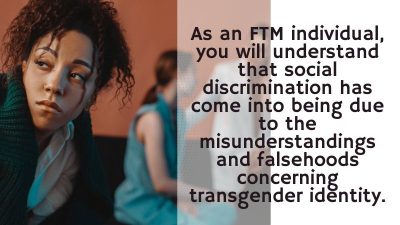 Social Challenges Faced by Ftm Individuals
Social Challenges Faced by Ftm Individuals
As an FTM individual, you will understand that social discrimination has come into being due
to the misunderstandings and falsehoods concerning transgender identity. The stigma, abuse,
harassment, discrimination, and exclusion are profoundly impacting on your mental health.
The social problems include:
 Discrimination and Stigma
Discrimination and Stigma
For FTM people, like most of the transgender individuals, they have to live with stigma and discrimination.
Such environments can cause a lot of loneliness and depression. This abuse could manifest itself as work or
housing discrimination, healthcare sector product and service denial, and verbal insults and persecutions.
Loneliness and Isolation
Gender transition estranges you from many friends and relatives and even your communities.
However, in the absence of peers’ and friends’ support, it can even become a cause of more despair.
Thus, you need a very supportive system that would assist.
Misunderstanding and Ignorance
Although misconceptions may come from well-wishers or even close family members,
many people misunderstand transgender experiences.
You can also manifest as accidental ignorance, inappropriate comments, and microaggressions.
While it may be challenging and traumatic to do so amid such difficulties, educating others
on the FTM identities is very important in helping you transition well.
 The Role of a Support Network
The Role of a Support Network
Support networks give you help that can come in several ways of support: financial, emotional, social, and physical.
Recall that you have such support from your relatives and friends nearby.
A steady ground gives you a way of walking through all the stages of transitioning into the person you want.
These networks help in:
 Emotional Maintenance: Empathy and Understanding
Emotional Maintenance: Empathy and Understanding
Your feelings allow for the stability of your mental health, allowing you to function properly and live a life.
There are many stages of transitioning, and some may involve a lot of frustration; hence, you have to get all the help possible.
It is essential to keep your emotions clear during the transitioning stage as if you have a robust support system,
then it will be possible for you to obtain stable emotions.
Practical Advice: Handling Social Challenges
You can reach out to the relevant law courts, health facilities, and also societies that deal with FTM issues.
For the FTMs, you should have sincerity and confidence as your social core.
When you become member of the LGBTQ or support groups,
being able to share your stories and ask for advice are both possible as well as forming a network where each one supports the other.
A good socialization includes building a system of support, establishing self-love, and telling all the friends or close relatives about any difficulties.
Get people to talk about the transgender case so that they can be less prejudiced and understand it with sympathy.
Positive self-regard also allows you to talk openly and honestly when sharing information with other people.
Creating a sense of community and acceptance
The mind requires to link up with individuals who encourage and love each other.
Therefore, socialization might make lonely individuals much less isolated along with liberating overwhelming ones.
It is much better than fighting against everyone since they may encourage you and be there for support whenever a problem presents itself.
Friends, family, and also the FTM people create a community by celebrating gender diversity.
Building and Maintaining a Support Network

Family and Friends: Teaching and Understanding
This entails teaching your loved ones about transgender life. But if you are sincere with yourself then it can establish reciprocal trust and also provide additional forces to you. You enable those around you to realize that you are knowledgeable enough for the journey through questions and information.
 Networking with FTM Individuals: Online and Offline Communities
Networking with FTM Individuals: Online and Offline Communities
There are many sites where you can interact with others in the gender transition,
such as online forums or social media groups, and even local support organizations.
They can offer real friendship and also knowledge.
Professional Support: Therapists, Support Groups, Mentors
You should look for professional help in processing the emotions of gender transition. Gender-specific therapists,
support groups, and mentors can help you all get around your issues.
Hence, with knowledgeable and compassionate personnel near you, you can become a great person.
 The Impact of a Supportive Environment on Mental Health
The Impact of a Supportive Environment on Mental Health
Here are some ways a supportive atmosphere improves well-being:
Reduces Stress and Anxiety
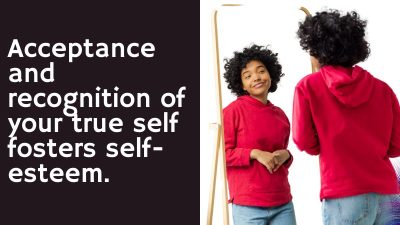 Without support, gender transitioning can be stressful. Fear of rejection, discrimination, and social stigma heighten stress and anxiety.
Without support, gender transitioning can be stressful. Fear of rejection, discrimination, and social stigma heighten stress and anxiety.
A supporting network, which enables you to respond with resilience and confidence, buffers these stressors.
Boosted self-confidence and self-esteem
Positive support networks provide self-confidence and social esteem, enabling you to handle the challenges of life. Acceptance and recognition of your true self fosters self-esteem. You need this self-confidence to socialize and accept transitional changes.
Improved overall well-being
Emotional well-being depends on support during gender transition. It is possible to increase your well-being through emotional support, practical advice, and community. A good support system acts as a shield against mental health problems and promotes individual development and adaptability.
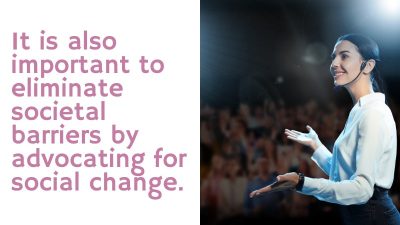 Overcoming Social Barriers: Advocacy and Education
Overcoming Social Barriers: Advocacy and Education
It is also important to eliminate societal barriers by advocating for social change.
It is possible to promote acceptance and tolerance among them and their supporters.
Here are ways of overcoming social barriers:
Increasing wider community awareness and understanding
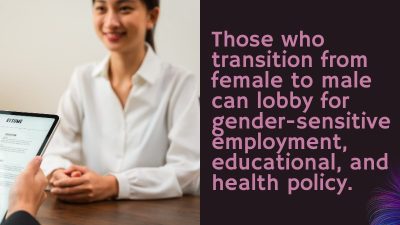
Through education, you can eliminate discrimination and stigma.
For the demystification of transgender identities, you can tell stories together with your activists in awareness programs.
Also, through raising communal consciousness, you can foster an acceptable atmosphere.
Promoting Gender-Inclusive Policies and Practices
Advocacy transcends relationships to influence systems.
Those who transition from female to male can lobby for gender-sensitive employment, educational, and health policy.
It is collective action from all of them that overcomes the institutional resistance and propels equality.
Promoting an inclusive and accepting society
To develop a more open society, it is of paramount importance to promote diversity and question stereotypes.
Others who could be a part of the gender diversity conversations, workshops, and events are your supporters who may help you.
 Resources for FTM Individuals and Allies
Resources for FTM Individuals and Allies
As Allies and FTM individuals, you require adequate resources to enable you to live well in society.
These resources include:
Organizations Offering Support and Information
Various organizations support and teach transgender persons. National Center for Transgender Equality, GLAAD,
and Trevor Project offer resources, helplines, and advocacy for us to enable you to solve your challenges.
Books, Articles, and Documentaries on FTM Experiences
Books, articles, and documentaries can enlighten allies about your FTM experiences.
For instance, you can read Stone Butch Blues by Leslie Feinberg and Becoming a Visible Man, written by Jamison Green.
Also, Disclosures and Transhood are documentary films that explore the trans stories of visibility.
Online Forums and Communities for Networking
There are also some online forums and groups that bring FTM people and allies together to share, connect, or help.
These forums and communities include Reddit’s FTM subreddit, Transgender Pulse,
and the online community of Transgender Equality Networking has support.
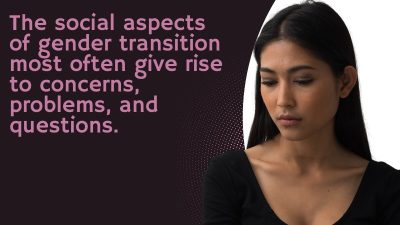 Addressing Common Concerns and FAQs
Addressing Common Concerns and FAQs
The social aspects of gender transition most often give rise to concerns, problems, and questions.
These concerns and questions include:
How to Come Out to Family and Friends?
Prepare yourself mentally and emotionally before coming out to your friends and family to avoid the feeling
of disappointment and frustration from their reactions.
You can also give them hints on what you are about to mention to them to make them prepared.
 Dealing with Unsupportive Individuals
Dealing with Unsupportive Individuals
Not everyone will approve and support you in your journey of discovering your identity.
You should not be bothered by individuals who do not want to support your progress and instead lean on the people who show you love and affection.
Balancing the Need for Support with Personal Privacy
Finding the right balance between assistance and privacy is important, and you can take your
time to reveal personal information when you feel at ease about disclosures.
Remember, establishing boundaries is necessary to preserve narrative control.
Tips for Finding Supportive Communities Online
Seek reliable social media, participate in discussions with others, and connect to people who share similar ideas.
You should report harassment and discrimination and ensure you do not provide personal information with carelessness.
 Conclusion
Conclusion
FTM individuals need resilience, support and advocacy to tackle the hurdles of social barriers in gender transition.
A firm support structure such as understanding family & friends, FTM contacts, and professional coaching can facilitate a successful transition.
Individuals and their allies aid in the acceptance of society’s gender diversity through education, advocating for inclusion, and finding sources.
Positive social support reinforces them in conquering obstacles and achieving true self-development.

 Basic Packers
Basic Packers Pack & Play
Pack & Play STP
STP